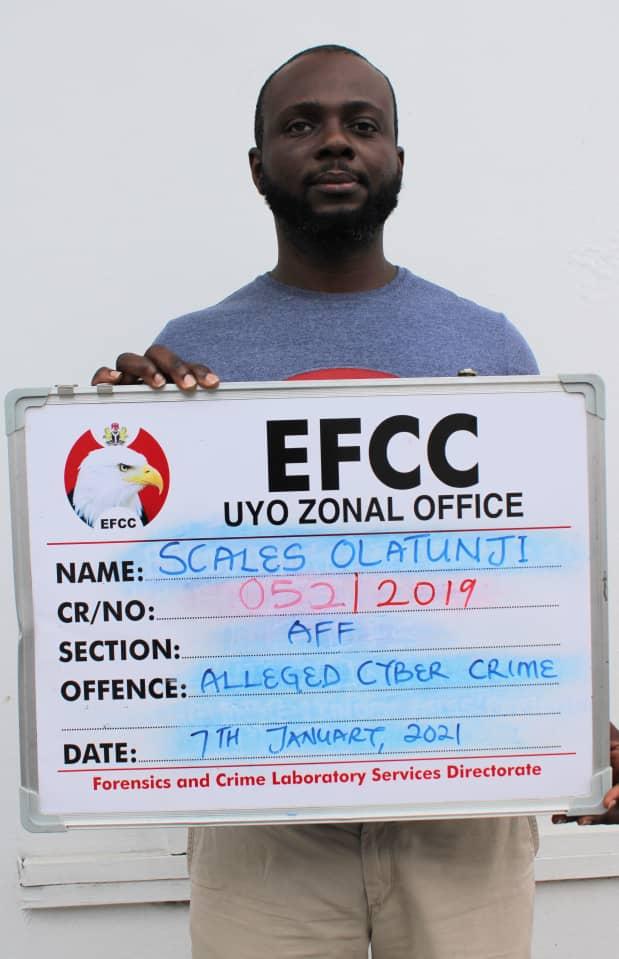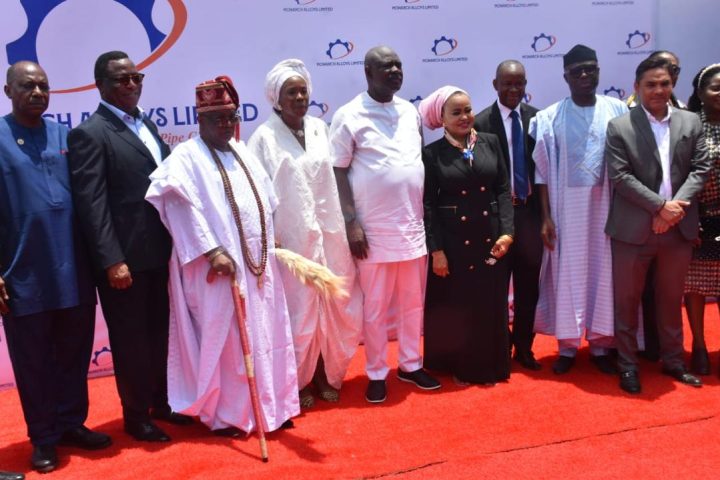Federal High Court, Uyo has convicted and sentenced an international fraudster, Scales Olatunji to 235 years imprisonment for Internet fraud and money laundering.
According to the EFCC Head of Media and Publicity, Wilson Uwujaren, Olatunji was arraigned on July 2, 2019 on 45-count charges bordering on identity theft, money laundering and conspiracy.
Join our WhatsApp ChannelHe pleaded “not guilty” to the charges, thus setting the stage for his trial.
One of the counts reads: “That you, Scales Olatunji Ishola “M”, Meraiyebu Charles “M”(at large), Gabriel Adeyemi Olugbenga “M”(at large), Ojomo Oluwatobi Ayodele “M”(at large) and Adekola Oluwatoyin “M”(at large), between January 2017 to October 2018, in Nigeria, within the jurisdiction of this Honourable Court conspired amongst yourselves to convert the total sum of N525,172,580.00 (Five Hundred and Twenty Five Million, One Hundred and Seventy-two Thousand, Five Hundred and Eighty Naira) only, which sum you reasonably ought to have known, forms part of proceeds of unlawful activities to wit: fraud (Business E-mail Compromise and Identity Theft), and thereby committed an offence contrary to Section 18 (a) of the Money Laundering (Prohibition) Act 2011 (as amended) and punishable under Section 15 (3) of the same Act”
Another count reads: “That you, Scales Olatunji Ishola “M” on or about the 15th day of May 2018, in Nigeria, within the jurisdiction of this Honourable Court with intent to defraud did send electronic messages (email) using emailoffice01@aol.com to one Monica Goulmoen of the Charity Association for providing girls and boys in Kobane with a football pitch, while impersonating a certain Per Ravn Omdal, a former Norwegian Football Association President, demanding the sum of €64,000.00 (Sixty-Four Thousand Euros) to be transferred to you via IBAN GB74HBUK40062132722119 which was paid and you thereby committed an offence contrary to Section 22 (3)(b) of the Cybercrimes (Prohibition, Prevention, etc) Act 2015 and punishable under Section 22 (4) of the same Act”.
EFCC‘s counsel, Nwandu Ukoha opened the case on November 7, 2019 and subsequently tendered 35 exhibits through four prosecution witnesses which were all admitted in evidence against the defendant. He closed the case on January 29, 2021 for the defence to open its defence.
Both the prosecution and defence counsel adopted their written addresses in October 2021, before the court adjourned for judgment.
Delivering judgment on Monday, June 27, 2022, Justice Agatha Okeke convicted Olatunji on all the 45- counts preferred against him by the EFCC. Justice Okeke held that, “the evidence of the prosecution witnesses are consistent and the prosecution established the guilt of the defendant in the case of money laundering as it relates to count one to five of the charges. The prosecution also established the guilt of the defendant in the offence of cybercrime as it relates to count six to forty five of the charges. The prosecution, on the totality of evidence before this court, proved the charges against the defendant”
The judge sentenced Olatunji to seven years imprisonment on counts one to five, and five years imprisonment on counts six to forty-five. The sentence, shall, however, run concurrently with effect from the date of arrest.
The court also ordered that the money in the convict’s account be forfeited to Norwegian citizens through the EFCC. Also, his properties: House No. 6, located on Road 2 West-end Estate, Ikota, Lekki, Lagos State and House No. 10, Donatus Odum Street, Ikate, Lagos State are to be sold by the EFCC and the proceeds restituted to the Norwegian victims.
The convict’s journey to the Correctional Centre started when operatives of the EFCC arrested him on March 20, 2019 at his Ikota, Lekki’s residence based on a petition from the Oslo Police District in Norway, requesting the assistance of the EFCC in investigating a network of Nigerians that had defrauded Norwegian citizens for years.
Investigations revealed that the convict belonged to a syndicate of internet fraudsters who specialized in Business Email Compromise (BEC).
Victor Ezeja is a passionate journalist with seven years of experience writing on economy, politics and energy. He holds a Master's degree in Mass Communication.




















Follow Us